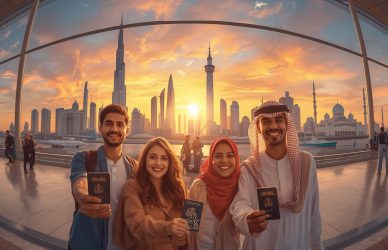Portugal latest immigration overhaul signals a strategic pivot toward attracting top-tier talent while safeguarding its vibrant tourism ecosystem. Enacted through Law No. 61/2025, the Portugal skilled work-seeking visa replaces the previous job-seeker program, prioritizing applicants with advanced expertise. This evolution not only bolsters the nation’s workforce but also recalibrates the balance between high-skill influxes and the seasonal demands of Portugal’s tourism powerhouse. As the country eyes sustainable development, these changes underscore a commitment to economic vitality without compromising visitor satisfaction.
Unveiling the Portugal Skilled Work-Seeking Visa: A Shift Toward Elite Talent
The Portugal skilled work-seeking visa marks a departure from the flexible 120-day entry permit that once allowed broad job hunts. Now, eligibility hinges on “advanced technical qualifications,” with specifics outlined in forthcoming guidelines from Portugal’s Agency for Integration, Migration and Asylum (AIMA). This targeted approach aims to funnel global innovators into tech, engineering, and research fields, enhancing Portugal’s edge in the European market.
Yet, this refinement ripples into tourism-dependent industries. Hospitality hubs in Lisbon, Porto, and the Algarve—reliant on entry-level roles like housekeeping and guiding—may face staffing hurdles. For international travelers, this could translate to subtler service disruptions, prompting a rethink of how Portugal maintains its allure as a seamless destination. To explore eligibility details, visit the official AIMA visa portel.
Tourism’s Frontline: How the Visa Reshapes Visitor Interactions
At its core, tourism fuels Portugal’s spirit, drawing millions for sun-kissed coasts and historic charm. The Portugal skilled work-seeking visa, by design, elevates specialized labor pools but leaves gaps in frontline positions. Seasonal spikes in visitor numbers often strain resources, and with fewer low-wage entrants, operators in restaurants, hotels, and excursion services might encounter recruitment bottlenecks.
Travelers pursuing bespoke experiences—think gourmet escapes in the Douro Valley or wellness retreats in Madeira—could sense these shifts through extended booking waits or elevated service fees. Eurostat reports underscore the urgency: over 58,000 unfilled roles nationwide, many in visitor-facing sectors like accommodations and leisure. This dynamic tests Portugal’s ability to deliver consistent excellence, ensuring that cultural immersion remains unmarred by operational strains.
Workforce Dynamics in Portugal’s Tourism Landscape
Tourism isn’t just an industry in Portugal—it’s the economic heartbeat, injecting over €20 billion into the coffers in 2024 alone and employing one in seven workers. The Portugal skilled work-seeking visa aligns with broader ambitions to upskill the economy, yet it spotlights vulnerabilities in labor-intensive niches. Construction for eco-resorts, farm-to-table sourcing, and transport logistics all crave reliable hands during high season.
Without adaptive measures, such as streamlined seasonal permits or training programs, businesses risk passing costs to guests, potentially dimming Portugal’s value-for-money appeal. Minister of Tourism Maria do Céu Antunes emphasizes workforce equilibrium as key to prosperity, urging a blend of innovation and inclusivity to keep the sector humming.
Tourism as Portugal’s Economic Anchor Amid Policy Flux
Beyond numbers, tourism weaves into Portugal’s fabric, boosting GDP by 12% and nurturing rural revival. The Portugal skilled work-seeking visa arrives at a crossroads, where immigration tweaks must harmonize with hospitality’s needs. Stakeholders worry that stricter entry could inflate operational expenses, nudging up prices for stays and tours— a concern echoed in industry forums.
Still, optimism prevails: by channeling skilled migrants into supportive roles like digital marketing for destinations, Portugal can amplify tourism’s reach. This synergy supports the government’s vision of equitable growth, where visitor dollars uplift communities without overburdening local talent pools.
Embracing Sustainable Tourism in the Visa Era
The Portugal skilled work-seeking visa isn’t solely a challenge—it’s a catalyst for greener horizons. Portugal’s national blueprint pivots toward regenerative travel, favoring mindful explorers over mass crowds. Initiatives like zero-waste hotels in the Azores and heritage trails in Sintra promote “slow travel,” letting guests savor authentic narratives at nature’s rhythm.
This ethos dovetails with environmental stewardship, curbing overtourism’s toll on fragile sites. By prioritizing eco-innovators via the visa, Portugal fosters resilient supply chains, from sustainable sourcing to carbon-neutral transport. For deeper insights into these efforts, check the Turismo de Portugal sustainability hub.
Innovating Tourism: Tech and Talent for a Brighter Future
Portugal’s forward-thinking ethos shines through tech infusions that complement the Portugal skilled work-seeking visa. Apps like “MaiGreece” (rebranded for broader appeal) deliver AI-curated itineraries, easing navigation of hidden gems from Évora’s Roman ruins to Lagos’ cliffs. Smart city integrations—think real-time crowd analytics in Porto—tackle congestion, enhancing safety and flow.
These advancements not only attract discerning demographics but also empower locals with data-driven tools for resource management. As AI evolves, it promises hyper-personalized journeys, from virtual previews of Fado nights to predictive eco-tours, solidifying Portugal’s rep as a tech-savvy haven.
Harmonizing Growth: The Path Forward for Portugal’s Tourism Vitality
The Portugal skilled work-seeking visa embodies a nuanced immigration strategy, threading the needle between elite recruitment and tourism’s grassroots demands. By fostering dialogue among policymakers, operators, and residents, Portugal can bridge skill divides—perhaps via hybrid visas for hybrid roles or upskilling academies in hospitality.
Ultimately, this balance safeguards the magic that lures 20 million annual guests: unspoiled beaches, soul-stirring cuisine, and heartfelt welcomes. Through sustainability, ingenuity, and collaboration, Portugal not only sustains its tourism legacy but elevates it, ensuring enduring prosperity for all who call it home or visit its shores.






